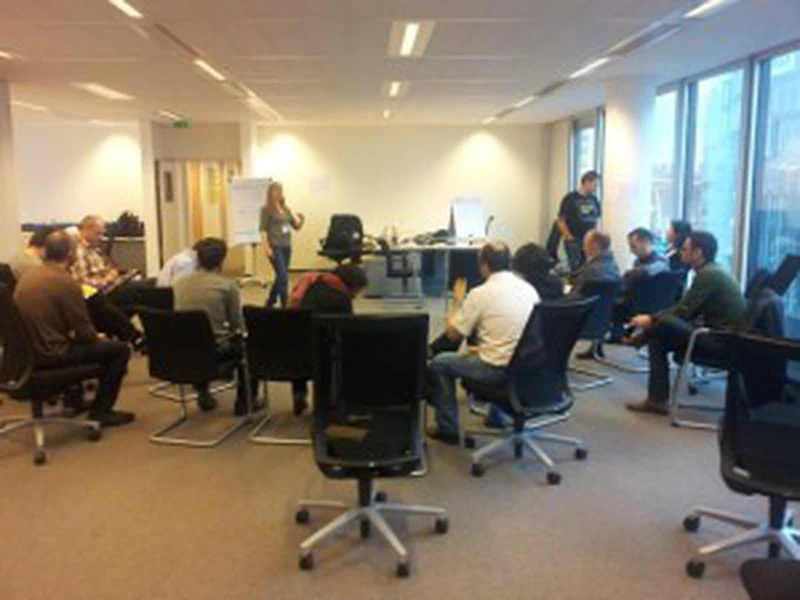A brief look back at the “coach retreat paris” 2012 organized by Oana Juncu (@ojuncu) with Yves Hanoulle (@yveshanoulle). I’m not going to go over the course of the day or the workshops that we were able to conduct because Sat has already done so, and well: here (even if it’s in English) or Yves (and again in English). Yes, but then what? I want to focus on 3 points: reflections on the format (what is a “code retreat”? , why “imagine”?) and a question (coach/consultant).

First
a detail (but the devil is in the details) “code retreat” has two meanings: everyone has in mind the “retreat” because the words in both languages are very similar. Spiritual retreat of a group of people in an isolated place to meditate or come together. But it’s also and originally the “re-treat”, treating again. We take a subject and we treat it, re-treat it, treat it again. There’s an ambiguity cleared up.
Next
a point that I noted from the beginning of our day. We projected ourselves onto imaginary situations, even though we knew they were very close to reality. Isn’t that a shame? I wonder. Why do we choose imaginary situations?
Hypothesis 1: so as not to focus on certain people’s situations? Not stigmatize them, not make them uncomfortable, not reveal their situation (we’re surrounded by competitors even if the level of trust is good)? Personally it wouldn’t bother me to talk precisely about some of my situations even if it puts me in an awkward position: the lesson would only be better. As for the question of competition, I can avoid mentioning the name of my clients, if people want to know, they know.
Hypothesis 2: so as not to lock ourselves into a very specific situation that will only really speak to the one who raises it? We did dot-voting on these imaginary situations, we could have done it on situations known to be real. In any case I don’t believe that a situation doesn’t interest me even if I haven’t encountered it so far. I think we always find a lesson, an interesting point that we can draw parallels with our experience. Finally the evocation of a real situation carried by a “product owner” seems much more tangible and powerful to me.
Hypothesis 3: (which joins hypothesis 2) the responses mentioned, considered, in a concrete situation will only be valid for that one. Context being fundamental. Yes. So what? What interests me is not so much the responses considered, but the way of considering these responses. What positioning, what reasoning, what mechanism of analysis do we implement, what actions do we propose? That’s the reason for this retreat/re-treat. For those who follow me on Twitter I’m very influenced by Cynefin these days. What interests me is therefore the good practices or best practices that my colleagues have been able to bring out or use (and it’s moreover also what we were offered during the day: “clickrewind”, “solution focussed”, “crucial confrontations”, “appreciative inquiry”, etc. are good practices). The moments when they challenged their clients’ habits to place them in an emergent environment. Why, how, observed effects, success, failure. Let’s discuss it. On something concrete even if I know it’s not reproducible it’s the way of doing (of coaching) that interests me.
I took advantage of the “Freeplay: no rules. You do as you wish” to propose to the group to have a more concrete approach. To try. I don’t know if this is really beneficial. But I drew a blank.
Finally,
to finish, the eternal question about the positioning coach or consultant came back several times. If I caricature (deliberately), are we coaches who whisper in the ear of our clients who integrate, digest as they wish, if they wish? Or are we consultants who indicate the best course to follow, the processes to deploy, the positions to take ? We are both. In the absolute (=wildcard) yes we must whisper in our clients’ ear: we cannot decree that they are convinced, or motivated. We are not in a position either to know the best answer. It’s they who know it and who must express it. (I was able -in a conference- to dare the comparison between the coach and the psychoanalyst). But like the teams that we accompany we have “deadlines”, client expectations (who solicit us) and an operational product to propose at regular intervals, processes to deploy. Let’s not try to separate these two facets of our profession. Coach? Consultant? I don’t believe that we can with Agile be either one or the other without losing something.
Thanks to Oana (whom I adore) for organizing this beautiful day, thanks to Yves for his presence.